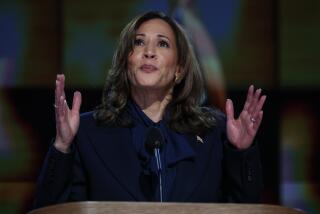The Middle Ground Is Still the Political Soil of America
- Share via
As the Democratic Party prepares to nominate Bill Clinton tonight for a second term as president, there’s much angst about how the party is not the “real” Democratic Party anymore. But what does that mean?
It’s true that the Democrats in Chicago are attempting, with only modest success, to put on a well-scripted, heart-tugging infoconvention, aping the Republican show in San Diego two weeks ago. Both parties want to appear united. Both parties this year have focused heavily, and uncontroversially, on family issues. In her speech Tuesday night, First Lady Hillary Rodham Clinton got big applause by reminding the audience that President Clinton had pushed for and signed the law, opposed by many business lobbyists, that allows unpaid time off to take care of a newborn child or sick relative. (She also clarified the meaning for Bob Dole and anyone else apparently unfamiliar with the African proverb “It takes a village to raise a child.’)
Despite similar GOP and Democratic convention themes that no one could fault--family, community, opportunity and responsibility--the same intraparty divisions that always existed still exist. The loudest party activists in the GOP are still more conservative than most of the country, and the loudest activists in the Democratic Party are still more liberal than most Americans. Given that most Americans are in the middle ground, it shouldn’t be surprising that the standard-bearers of each party are essentially moderate. This is not a bad thing for this large and diverse nation, yet this is a fact that some activists in the parties cannot seem to accept.
Hard-line anti-abortion and anti-immigration activists don’t trust Dole. Staunch advocates of keeping welfare as a federal program are unhappy with Clinton for signing a sweeping welfare reform bill, after he hung his 1992 election campaign on changing welfare “as we know it.”
True, the way he chose to keep that pledge wasn’t pretty. The Rev. Jesse Jackson, once the political outsider, now proudly hailing his son as a congressman, in his convention speech Tuesday night called upon his party to maintain a moral as well as political center. His chiding of the Democrats not to forget the poor and the downtrodden was, in one sense, not all that different from Colin Powell’s exhortation to the GOP to open its doors to greater diversity: Both men were allowed to make speeches to appease restless constituencies.
But the very moderation--less kindly put, downright vacillation--for which Dole and, especially, Clinton have been so criticized may be appealing to voters. In a report by Times staff writer Nina J. Easton, experts who have studied human behavior and the nature of leadership say that a “manysidedness” may be an appropriate leadership response in a fast-changing world. No principles, or “manysidedness”? While it will drive ideological purists up the wall, the answer is somewhere in between.
More to Read
Get the L.A. Times Politics newsletter
Deeply reported insights into legislation, politics and policy from Sacramento, Washington and beyond. In your inbox three times per week.
You may occasionally receive promotional content from the Los Angeles Times.










